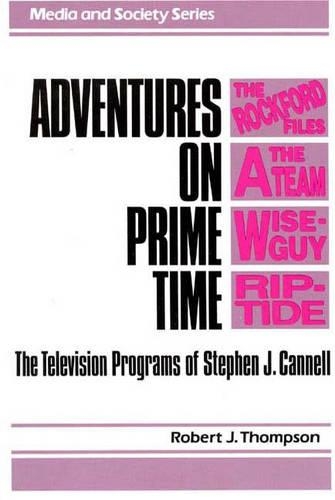
Adventures on Prime Time: The Television Programs of Stephen J. Cannell
(Hardback)
Publishing Details
Adventures on Prime Time: The Television Programs of Stephen J. Cannell
By (Author) Robert Thompson
Bloomsbury Publishing PLC
Praeger Publishers Inc
22nd June 1990
United States
Classifications
Tertiary Education
Non Fiction
Film history, theory or criticism
791.4575
Physical Properties
Hardback
160
Description
The author examines the work of Stephen J.Cannell, one of television's most prolific and successful producers. Thompson uses theories of film authorship revised for application to television texts and provides close analysis of Cannell's programs, including individual episodes of "The Rockford Files", "The A-Team" and "The Greatest American Hero". Moving away from the notion that a television series is the creation of an individual author, the book begins with a look at the televisionmaker. Thompson probes the polyauthorial nature of the medium and introduces a new method of studying television authorship. The book then turns to Cannell and a study of his career, focusing on how he developed the formula for his many highly rated television series. Students and teachers of television and television criticism should find "Adventures on Prime Time" a source of ideas about the nature of the medium.
Reviews
Thompson usefully surveys the anomalies of TV auteurism, establishing its characteristic recombinance' and the hyphenate' (writer-producer). Happily Stephen Cannell's Hardcastle provides a definition for auteurism: Criminals commit the same crime over and over again' (p.118). But as he is less a critical analyst than a journalist, Thompson's goal is misdirected: to juxtapose biographical information about Cannell with the texts he wrote and produced and to examine the fit.' Thompson diminishes Cannell's works by centripetally reading them as autobiography' instead of exploring wider themes. For example, in The Greatest American Hero the magical suit (with lost directions) more interestingly alludes to runaway technology (nuclear or otherwise) than it represents the lack of clear rules for successful TV writing. With unsettling imprecision Thompson uses autobiography' for TV career, ' hubris' for authorial vanity, ' and Trojan horses' for disguise.' Thompson's autobiographical' parallels do not establish Cannell as working in metatelevision' as Moonlighting did. Variations on formulas do not make the Cannell canon a history of his career in television, ' nor does his casting of a stock company foreground the artificiality of the presentation'--not for Cannell, not for Ingmar Bergman, not for John Ford. Nonetheless, Thompson does prove that this writer-producer has stamped a distinctive tone as well as recurrent concerns and strategies on his wide range of TV series. One suspects that Cannell's art would sustain more ambitious explication than Thompson undertakes.-Choice
"Thompson usefully surveys the anomalies of TV auteurism, establishing its characteristic recombinance' and the hyphenate' (writer-producer). Happily Stephen Cannell's Hardcastle provides a definition for auteurism: Criminals commit the same crime over and over again' (p.118). But as he is less a critical analyst than a journalist, Thompson's goal is misdirected: to juxtapose biographical information about Cannell with the texts he wrote and produced and to examine the fit.' Thompson diminishes Cannell's works by centripetally reading them as autobiography' instead of exploring wider themes. For example, in The Greatest American Hero the magical suit (with lost directions) more interestingly alludes to runaway technology (nuclear or otherwise) than it represents the lack of clear rules for successful TV writing. With unsettling imprecision Thompson uses autobiography' for TV career, ' hubris' for authorial vanity, ' and Trojan horses' for disguise.' Thompson's autobiographical' parallels do not establish Cannell as working in metatelevision' as Moonlighting did. Variations on formulas do not make the Cannell canon a history of his career in television, ' nor does his casting of a stock company foreground the artificiality of the presentation'--not for Cannell, not for Ingmar Bergman, not for John Ford. Nonetheless, Thompson does prove that this writer-producer has stamped a distinctive tone as well as recurrent concerns and strategies on his wide range of TV series. One suspects that Cannell's art would sustain more ambitious explication than Thompson undertakes."-Choice
Author Bio
ROBERT J. THOMPSON is an Associate Professor at the State University of New York at Cortland, the Director of the Radio-TV-Film N.H.S.I summer program at Northwestern University, and an occasional visiting Professor at Cornell University. In addition to the present volume, he is the co-editor of two anthologies of essays entitled Television Studies: Textual Analysis (Praeger) and Making Television: Authorship and the Production Process (Praeger).
